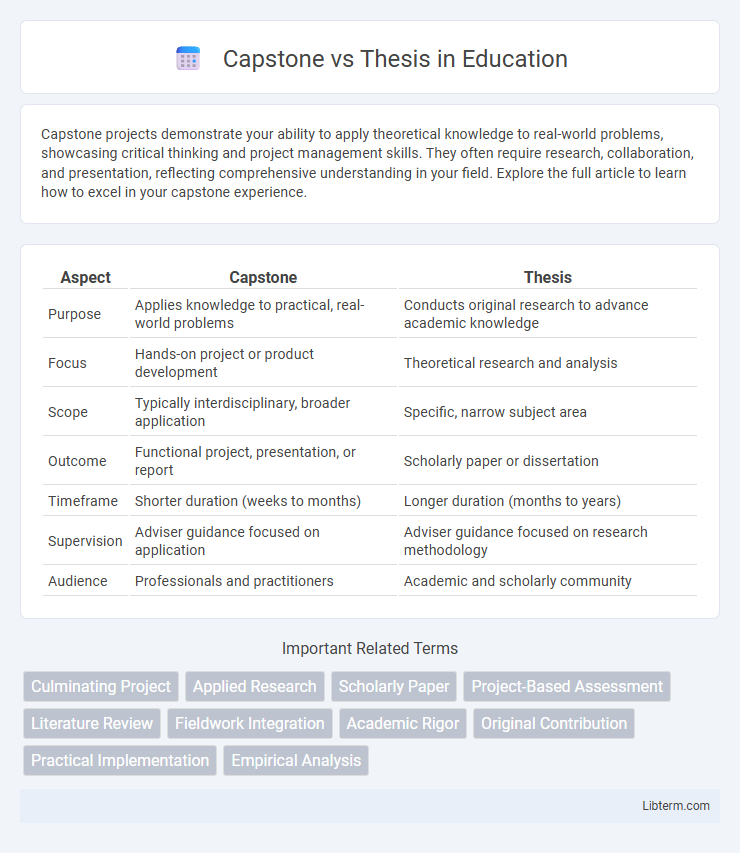Capstone projects demonstrate your ability to apply theoretical knowledge to real-world problems, showcasing critical thinking and project management skills. They often require research, collaboration, and presentation, reflecting comprehensive understanding in your field. Explore the full article to learn how to excel in your capstone experience.
Table of Comparison
| Aspect | Capstone | Thesis |
|---|---|---|
| Purpose | Applies knowledge to practical, real-world problems | Conducts original research to advance academic knowledge |
| Focus | Hands-on project or product development | Theoretical research and analysis |
| Scope | Typically interdisciplinary, broader application | Specific, narrow subject area |
| Outcome | Functional project, presentation, or report | Scholarly paper or dissertation |
| Timeframe | Shorter duration (weeks to months) | Longer duration (months to years) |
| Supervision | Adviser guidance focused on application | Adviser guidance focused on research methodology |
| Audience | Professionals and practitioners | Academic and scholarly community |
Introduction: Capstone vs Thesis
The introduction of a capstone project typically outlines a practical problem or real-world challenge, emphasizing application and integration of skills learned in coursework. In contrast, a thesis introduction centers on presenting a research question or hypothesis, providing background, and establishing the academic context for original investigation. Both serve to frame the scope and purpose, but capstone emphasizes applied outcomes, while thesis highlights theoretical contribution.
Defining Capstone Projects
Capstone projects are comprehensive, practical assignments designed to synthesize knowledge and skills acquired throughout a degree program by addressing real-world problems or challenges. These projects often involve interdisciplinary collaboration, application of theoretical concepts, and the creation of tangible deliverables such as reports, presentations, or prototypes. Capstone projects emphasize experiential learning and critical thinking, contrasting with theses, which primarily focus on original research and academic scholarship.
Understanding the Thesis
A thesis is a research-driven academic document that requires students to formulate and investigate a specific hypothesis or question, demonstrating in-depth expertise in their field of study. It involves extensive literature review, data collection, and critical analysis to contribute original knowledge or insights. This rigorous process emphasizes scholarly rigor and prepares students for further academic or professional research roles.
Key Differences Between Capstone and Thesis
Capstone projects emphasize practical application and real-world problem solving, often culminating in a project or presentation, whereas theses focus on original research contributing new knowledge to a specific academic field. Capstones typically require a shorter time commitment and involve interdisciplinary collaboration, while theses demand extensive literature review, hypothesis testing, and a formal written document. Graduate programs often use capstones to demonstrate mastery of applied skills, contrasting with theses, which showcase scholarly research and theoretical understanding.
Academic Objectives and Outcomes
Capstone projects emphasize practical application and problem-solving within a real-world context, aiming to develop professional skills and integrate knowledge from various disciplines. Theses focus on original research, contributing new insights to academic fields through rigorous methodology and theoretical analysis. Academic outcomes of capstones center on experiential learning and career readiness, while theses prioritize scholarly contribution and mastery of research techniques.
Research Methods and Approaches
Capstone projects typically emphasize applied research methods, focusing on practical problem-solving and the integration of interdisciplinary approaches to address real-world issues. Theses prioritize rigorous theoretical research, often utilizing quantitative or qualitative methodologies to contribute original knowledge within a specific academic discipline. The choice between capstone and thesis depends on the desired balance between applied practice and theoretical investigation in research approaches.
Project Structure and Format
Capstone projects emphasize practical application and typically involve a proposal, research, product development, and presentation, often structured with defined milestones and deliverables. Thesis format requires a formal academic structure including an abstract, literature review, methodology, results, discussion, and references, aiming for original research contribution. Both formats demand rigorous documentation, but capstones prioritize real-world solutions while theses focus on theoretical frameworks and detailed analysis.
Skills Developed Through Capstone and Thesis
Capstone projects develop practical skills such as problem-solving, project management, and real-world application of academic knowledge through hands-on experience and collaboration with industry partners. Thesis work enhances research skills, critical analysis, and academic writing by requiring in-depth study, data collection, and synthesis of scholarly sources. Both paths cultivate communication and time management skills but emphasize different strengths aligned with professional versus academic career goals.
Choosing Between Capstone and Thesis
Choosing between a capstone project and a thesis depends on your academic and career goals, with capstones emphasizing practical application and theses focusing on original research. Capstones often suit students aiming for hands-on experience or professional fields, while theses are ideal for those pursuing advanced degrees or academic careers. Consider program requirements, time constraints, and your interest in research depth to make the best decision.
Conclusion: Which is Right for You?
Choosing between a capstone project and a thesis depends on your academic goals and career plans. A capstone emphasizes practical application and problem-solving, ideal for students seeking hands-on experience and industry readiness. A thesis focuses on original research and theoretical analysis, suited for those aiming for academic advancement or graduate study.
Capstone Infographic

 libterm.com
libterm.com